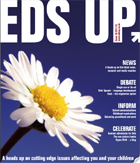
click above to browse
through
the current issue


Want to see your child's
work in print? The winner
will receive a �25 book voucher.
Email:
[email protected]
BREAST IS BEST BUT WE ARE STILL NOT SURE WHY!
New research into breast-feeding has hit the headlines in two different studies to come out in the last few months. “Breast-fed children are brainier” was the first to attract media attention after 14,000 children in Belarus were monitored over six and a half years. The doctors found that those who had been exclusively breast-fed scored 7.5 points higher in verbal intelligence tests and 5.9 points higher in overall IQ tests. The study was well prepared and control groups set up, leading the researchers to believe that their results were more reliable than earlier studies. However, the research led by Michael Kramer, a Professor of Paediatrics, at the McGill University in Montreal, said that the results failed to answer the question of exactly what it is about breast-feeding that boosts intelligence.
Doctors found that those who had been exclusively breast-fed scored 7.5 points higher in verbal intelligence tests and 5.9 points higher in overall IQ tests
The same dilemma faced researchers in Buenos Aires. In a much smaller study, 119 infants were monitored to see if breast-feeding helped to protect the babies from severe chest infections. In this study, the babies were premature and from a low socio-economic group, but the results seemed to show that girls fared better. Dr Polack from the John Hopkins Children’s Centre in Baltimore reports that breast-feeding did not affect the number of infections baby girls caught but reduced their severity. Strangely, the evidence showed that the same protection was not afforded to boy babies as nearly one fifth of boys developed respiratory infections severe enough to need hospital treatment whether they were breast-fed or not.
“If breast milk can trigger a protective mechanism against respiratory infections, the next puzzle will be to understand why it is more easily activated in girls than boys”
Like Michael Kramer, Dr Polack had to conclude that there is still a lot to discover: “If breast milk can trigger a protective mechanism against respiratory infections, the next puzzle will be to understand why it is more easily activated in girls than boys.”
The NHS Knowledge Service gave out an important message to doctors on their website. Regardless of any limitations of the two studies: “The benefits of breastfeeding are clearly established” and these studies only “serve again to promote the idea that breast is best.”
|

